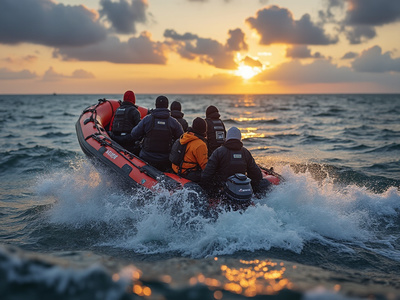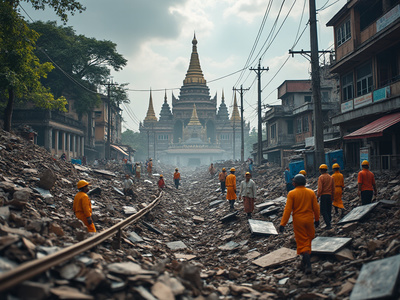
UK Prime Minister Sir Keir Starmer Meets Allies in Paris to Discuss Ukraine Coalition Plans
Starmer's discussions focus on military strategies and peacekeeping initiatives amid ongoing tensions between Ukraine and Russia.
Sir Keir Starmer, the UK Prime Minister, attended a summit in Paris with allies to address ongoing military and strategic support for Ukraine in its conflict with Russia.
The meeting, part of the so-called coalition of the willing, involved discussions on military planning and peacekeeping arrangements.
Starmer, alongside other leaders, accused Russian President Vladimir Putin of failing to uphold commitments in ceasefire negotiations, stating that Putin's assurances were 'hollow'.
French President Emmanuel Macron suggested during the summit the possible establishment of a European peacekeeping force that could potentially respond to any further aggression from Russia.
Starmer engaged in bilateral discussions with NATO officials, emphasizing the importance of maintaining momentum in supporting Ukraine.
He noted that 'excellent progress' had been made in strategizing a robust military presence to deter further hostilities from Moscow.
The summit followed a series of meetings among military planners from various nations at the UK’s Northwood headquarters, where more than 200 officials drafted potential frameworks for future military deployments.
Key points of discussion included the structure of air, maritime, and land forces that could be mobilized to assist Ukraine.
The Downing Street stated that the Prime Minister would convey that Europe is 'mobilising together in pursuit of peace.'
Ukraine's President Volodymyr Zelensky was also in attendance and held discussions with President Macron prior to the broader meeting.
Zelensky has consistently emphasized Ukraine’s commitment to negotiating peace while securing international support against Russian aggression.
Starmer’s remarks underscored the urgency for Russia to engage meaningfully in the peace talks.
He described Putin's recent actions as 'playing games' in regard to a naval ceasefire agreement between Ukraine and Russia, particularly in the Black Sea, despite cooperative efforts between the US, Ukraine, and Russia.
The summit discussed accusations from both nations regarding violations of a tentative ceasefire designed to halt attacks on energy infrastructure.
In a statement from the White House, both nations were reported to have agreed to efforts to 'ensure safe navigation' in the Black Sea.
However, negotiations over ceasefire terms have not yet yielded substantial results, with both sides continuing military operations.
Following discussions in Paris, Starmer noted a consensus among European allies on maintaining sanctions against Russia, emphasizing that easing such measures would not be timely.
This sentiment was echoed by Zelensky, who framed sanctions as critical levers for pressuring Russia into serious negotiations.
The coalition leaders discussed the potential deployment of a 'reassurance force' of European troops to secure any peace agreements, which Macron highlighted would not replace or substitute for the Ukrainian military stances.
As the meeting concluded, Zelensky expressed concerns over potential new Russian offensives aimed at regions within Ukraine, continuing a pattern of escalating military tensions.
Starmer, in his address, reiterated the coalition's commitment to ensuring Ukraine remains capable of defending itself during negotiations, underlining the necessity of a united front among Ukraine's allies.
The dialogues in Paris signify continued international collaboration to address the conflict while seeking pathways toward a sustainable resolution.
The meeting, part of the so-called coalition of the willing, involved discussions on military planning and peacekeeping arrangements.
Starmer, alongside other leaders, accused Russian President Vladimir Putin of failing to uphold commitments in ceasefire negotiations, stating that Putin's assurances were 'hollow'.
French President Emmanuel Macron suggested during the summit the possible establishment of a European peacekeeping force that could potentially respond to any further aggression from Russia.
Starmer engaged in bilateral discussions with NATO officials, emphasizing the importance of maintaining momentum in supporting Ukraine.
He noted that 'excellent progress' had been made in strategizing a robust military presence to deter further hostilities from Moscow.
The summit followed a series of meetings among military planners from various nations at the UK’s Northwood headquarters, where more than 200 officials drafted potential frameworks for future military deployments.
Key points of discussion included the structure of air, maritime, and land forces that could be mobilized to assist Ukraine.
The Downing Street stated that the Prime Minister would convey that Europe is 'mobilising together in pursuit of peace.'
Ukraine's President Volodymyr Zelensky was also in attendance and held discussions with President Macron prior to the broader meeting.
Zelensky has consistently emphasized Ukraine’s commitment to negotiating peace while securing international support against Russian aggression.
Starmer’s remarks underscored the urgency for Russia to engage meaningfully in the peace talks.
He described Putin's recent actions as 'playing games' in regard to a naval ceasefire agreement between Ukraine and Russia, particularly in the Black Sea, despite cooperative efforts between the US, Ukraine, and Russia.
The summit discussed accusations from both nations regarding violations of a tentative ceasefire designed to halt attacks on energy infrastructure.
In a statement from the White House, both nations were reported to have agreed to efforts to 'ensure safe navigation' in the Black Sea.
However, negotiations over ceasefire terms have not yet yielded substantial results, with both sides continuing military operations.
Following discussions in Paris, Starmer noted a consensus among European allies on maintaining sanctions against Russia, emphasizing that easing such measures would not be timely.
This sentiment was echoed by Zelensky, who framed sanctions as critical levers for pressuring Russia into serious negotiations.
The coalition leaders discussed the potential deployment of a 'reassurance force' of European troops to secure any peace agreements, which Macron highlighted would not replace or substitute for the Ukrainian military stances.
As the meeting concluded, Zelensky expressed concerns over potential new Russian offensives aimed at regions within Ukraine, continuing a pattern of escalating military tensions.
Starmer, in his address, reiterated the coalition's commitment to ensuring Ukraine remains capable of defending itself during negotiations, underlining the necessity of a united front among Ukraine's allies.
The dialogues in Paris signify continued international collaboration to address the conflict while seeking pathways toward a sustainable resolution.











